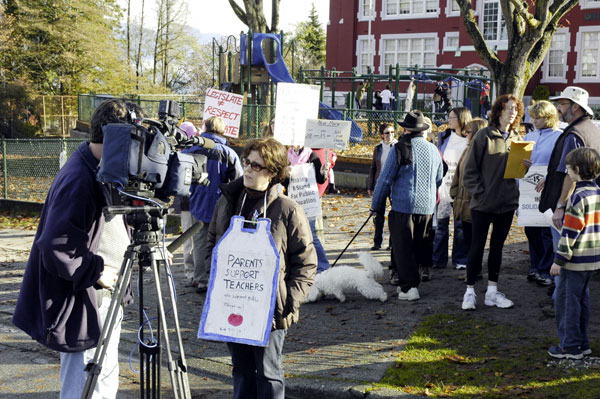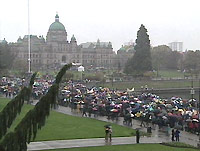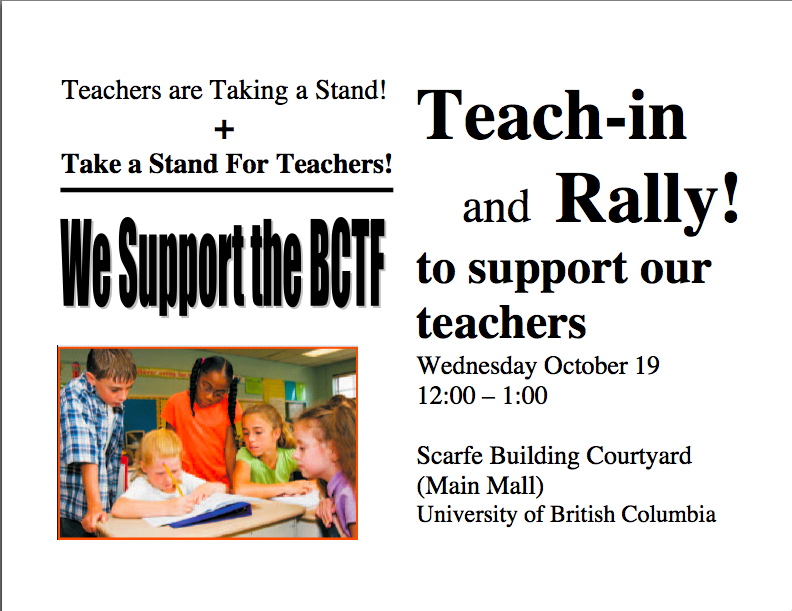VANCOUVER(CKNW/AM980) – Lawyers for the BC Teachers Federation and BC Public School Employers Association were back in court this afternoon to ask for some clarifications on yesterday’s unprecedented ruling from BC Supreme Court Justice Brenda Brown.
Saying she did not intend to muzzle anyone’s freedom of speech, the judge has cleared up confusion about her unique orders.
Brown maintains the union is not allowed to use any assets –including phones, fax machines and computers– to keep the illegal strike going but —Larry Prentice, senior vice president, Ernst and Young Inc– the court-appointed monitor, will only be required to report irregularities involving finances.
Ernst and Young is a transnational company with a truly global reach.
As a global leader in professional services, Ernst & Young is committed to helping restore the public’s trust in professional services firms and the quality of financial reporting.
Source: Ernst and Young web page
See also the feature in magazine of the Canadian Association of Insolvency and Restructuring Professionals Rebuilding SuccessSummary of Rebuilding Success Story
(This abridged version follows the structure of the original as published in spring 2005)
In August of 2003 Larry and elementary school teacher second wife Linda Rizzardo (Prentiss was divorced in the late 1980s, early 1990s and remarried in 1992) bought a new home of Vancouver’s West Side and a membership in the Shaughnessy Golf and Country Club. He planned to engage in a lot of G & G (Golf and gardening)
His planned time off was interrupted by a call from the Office of the Superintendent of Bankruptcy with an invitation to join its Management Advisory Board. He was recruited to join the board of the Insolvency Institute of Canada. In February 2004 Janis Sarra, Assistant Dean of Law UBC ‘twisted his arm’ to serve as director for the Canadian Insolvency Foundation.. And it goes on . . .
From Rock ‘N Roll to Receivership.
Prentice aspired to be a teacher and a rock musician. He dropped out of UBC’s B.Ed. program in third year to begin a career as a member of a rock band.
Eight months later a cousin who had his own charted accounts firm offered him a job. Prentice found that “it was kind of interesting.”
With this experience in mind Prentice returned to his studies and enrolled in the Commerce program at SFU earning his degree in 1975 and qualified as a C.A. at Clarkson Gordon (now Ernst & Young where he remains to this day) in 1978.
Initially working in the audit division he found it uninteresting as a career and eventually found his way to insolvency “which seemed to be . . .a lot of fun.” His initial files were liquidations and then restructuring.
Prentice was a court appointed monitor for Woodwards Department Stores.
More recently receiverships have given way to restructurings. “Now we look first at whether the business can be revived rather than liquidated” said Prentice.
————————————–
A north coast angle: Larry Prentice was also the court appointed receiver for Prince Rupert’s ill-fated pulp mill and associated timber and milling operations.
————————————–
From the Globe and Mail
Monitor overseeing teachers’ strike activities once wanted to teach>
By ROD MICKLEBURGH
Saturday, October 15, 2005 Page S3
Larry Prentice didn’t waste time rolling up his well-tailored sleeves and getting to work as the trailblazing independent monitor appointed to scrutinize the B.C. Teachers’ Federation’s strike activities.
Mr. Prentice, a partner and senior vice-president in Ernst & Young’s Vancouver office, showed up at the BCTF’s nifty headquarters on WestSixth Avenue at 8 p.m. Thursday.
That was just seven hours after Madam Justice Brenda Brown’s innovative ruling put him in the accounting hot seat of the fractious teachers’ dispute. But first, the man who made a name for himself as one of the province’s premier insolvency experts had to clear up a possible conflict of interest.
Guess what? Mr. Prentice is married to an elementary school teacher. B.C. Supreme Court Chief Justice Donald Brenner, who appointed the 54- year-old, garage band rocker-turned chartered accountant, said that was fine.
No conflict.
There’s more. Guess what Mr. Prentice wanted to do with his life when he grew up? Yep. He wanted to be a teacher.
In fact, he was in the third year of UBC’s five-year education program, before deciding that teaching was not for him. “I wasn’t very good at it,” Mr. Prentice confessed in a magazine this year.
Somehow, after eight months in a Vancouver club band, Mr. Prentice discovered the buzz of accounting, eventually embracing the intrigue of insolvency, which, he once said, “seemed to be a lot of fun,” at least for accountants.
His first case was an insolvent hog-butchering plant in the Fraser Valley. Emotions ran high among those who had not been paid, ranging from tears to one furious pig farmer who threatened to go down to the bankrupt plant and remove his carcasses at gunpoint.
Compared with that, Mr. Prentice’s BCTF assignment should be a breeze. And a better smelling one, too!
It is often said that the government has had to impose a settlement on the BCTF in every round of teacher-trustee bargaining since provincewide bargaining was brought in by the NDP in 1994. Not so.
In 1996, teachers voted 89 per cent to accept a three-year contract providing a wage hike of 2 per cent.
Although this followed legislation giving the government power to impose a settlement, that clout was never used. The final agreement was voluntary.
In 1998, with the NDP still in government, teachers again accepted a new, three-year contract giving them a 2-per-cent pay increase. However, this contract also included a promise to hire 1,200 more teachers and set class-size limits in elementary school.
The government eventually did pass legislation to impose these terms, but only after the province’s school boards — not the teachers –voted it down.
This history lesson does not mean the current collective-bargaining system is anything less than dysfunctional. It does show that reasonable agreements have been reached with B.C. teachers in the past — under the NDP.
Not that relations were ever lovey-dovey between the BCTF and the New Democrats.
In 1993, Glen Clark declared that teacher bargaining at the local school board level was unfairly tilted in favour of the union.
And a year later, after the NDP brought in provincewide bargaining, then education minister Art Charbonneau was unceremoniously asked not to show up at the BCTF’s annual convention.
“We suddenly have a lot more on our agenda,” explained the teachers’ president at the time, Ray Worley.



